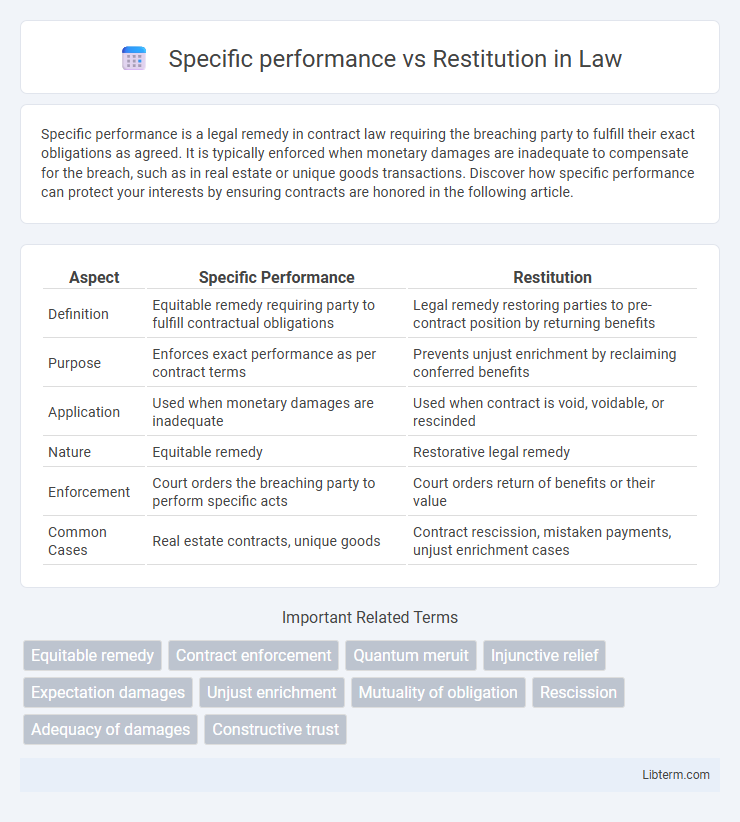Specific performance is a legal remedy in contract law requiring the breaching party to fulfill their exact obligations as agreed. It is typically enforced when monetary damages are inadequate to compensate for the breach, such as in real estate or unique goods transactions. Discover how specific performance can protect your interests by ensuring contracts are honored in the following article.
Table of Comparison
| Aspect | Specific Performance | Restitution |
|---|---|---|
| Definition | Equitable remedy requiring party to fulfill contractual obligations | Legal remedy restoring parties to pre-contract position by returning benefits |
| Purpose | Enforces exact performance as per contract terms | Prevents unjust enrichment by reclaiming conferred benefits |
| Application | Used when monetary damages are inadequate | Used when contract is void, voidable, or rescinded |
| Nature | Equitable remedy | Restorative legal remedy |
| Enforcement | Court orders the breaching party to perform specific acts | Court orders return of benefits or their value |
| Common Cases | Real estate contracts, unique goods | Contract rescission, mistaken payments, unjust enrichment cases |
Introduction to Specific Performance and Restitution
Specific performance enforces the exact terms of a contract, compelling a party to fulfill their obligations when monetary damages are inadequate. Restitution aims to restore the injured party to their original position by returning any unjust enrichment received. Both remedies serve distinct purposes: specific performance ensures contract fulfillment, while restitution prevents unjust enrichment.
Defining Specific Performance in Contract Law
Specific performance in contract law is an equitable remedy compelling a party to fulfill their contractual obligations as originally agreed, rather than providing monetary compensation. It is typically granted when damages are inadequate, particularly in cases involving unique goods or property. Specific performance ensures the aggrieved party receives exactly what was contracted, enforcing the precise terms of the agreement.
Understanding Restitution and Its Legal Basis
Restitution is a legal remedy designed to restore a party to the position they occupied before a contract was breached by compelling the return of unjust enrichment. Rooted in equity and contract law, its basis lies in preventing one party from benefiting unfairly at another's expense. Unlike specific performance, which enforces exact contractual terms, restitution emphasizes reversal of gains rather than carrying out original obligations.
Key Differences Between Specific Performance and Restitution
Specific performance compels a party to fulfill their contractual obligations exactly as agreed, typically used when monetary damages are inadequate, such as in real estate transactions. Restitution aims to restore the injured party to their original position by returning any benefits unjustly received, focusing on preventing unjust enrichment rather than enforcing the contract terms. The key difference lies in specific performance enforcing contract execution, while restitution emphasizes compensation by reversing unjust gains.
Legal Requirements for Granting Specific Performance
Specific performance requires a valid contract, clear terms, and the inadequacy of monetary damages as a remedy to justify enforcement. The plaintiff must demonstrate the defendant's breach and the uniqueness of the subject matter, such as real estate or rare goods, making substitution impossible. Courts also consider feasibility of enforcement and equitable factors like clean hands before granting specific performance.
Circumstances Favoring Restitution Over Specific Performance
Restitution is favored over specific performance in situations where contract enforcement would be impractical or unfair, such as when unique goods cannot be delivered or when personal services are involved. Courts prioritize restitution to prevent unjust enrichment, particularly when the non-breaching party has already provided benefits or partial performance. This remedy provides monetary compensation reflecting the value conferred, rather than compelling exact contract terms.
Advantages and Disadvantages of Specific Performance
Specific performance compels a party to fulfill contractual obligations, ensuring precise adherence to agreed terms, which is advantageous when monetary damages are insufficient, such as in unique property transactions. However, specific performance can be difficult to enforce, may cause extended litigation, and is not suitable for contracts requiring continuous supervision or personal services. This remedy provides certainty and exact compliance but lacks flexibility and may impose unrealistic burdens on courts and parties alike.
Advantages and Disadvantages of Restitution
Restitution offers the advantage of restoring the injured party to their original position by returning the value of benefits unjustly received, which is especially useful when contract performance is impossible or impractical. However, its disadvantage lies in potentially inadequate compensation compared to the contract's expected benefits, as it does not enforce the exact fulfillment of contractual obligations unlike specific performance. Restitution also simplifies dispute resolution by focusing on monetary recovery rather than complex enforcement of terms, but this may lead to undercompensation in cases where the unique value of performance cannot be quantified.
Case Law Examples: Specific Performance vs Restitution
In contract law, specific performance compels a party to fulfill their contractual obligations as seen in *Beswick v Beswick* (1968), where the court enforced specific performance to ensure the widow received the agreed payments. Restitution, by contrast, aims to restore the injured party to their original position, illustrated in *Fibrosa Spolka Akcyjna v Fairbairn Lawson Combe Barbour Ltd* (1943), where restitution was awarded due to frustration of contract. These cases highlight the courts' preference for specific performance when damages are inadequate, whereas restitution applies to prevent unjust enrichment.
Choosing Between Specific Performance and Restitution: Key Considerations
Choosing between specific performance and restitution hinges on the nature of the contractual breach and the adequacy of monetary damages. Specific performance is preferred when the subject matter is unique, such as real estate or rare goods, making monetary compensation insufficient to remedy the harm. Restitution aims to restore the injured party to their pre-contract position and is typically favored when unjust enrichment occurs without the feasibility or fairness of enforcing contract terms.
Specific performance Infographic

 libterm.com
libterm.com